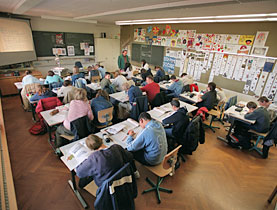Mr Switzerland turns spotlight on illiteracy

An estimated 800,000 adults in Switzerland have problems with reading and writing, yet the taboo surrounding the issue means many suffer in silence.
The recent admission by the new Mr Switzerland, André Reithebuch, that he is one of that number has drawn attention to the hidden problem of illiteracy in Switzerland. It has also earned him both praise and criticism.
The Swiss Reading and Writing Federation is responsible for raising awareness of illiteracy in Switzerland. Partly funded by the Federal Culture Office, it is attempting to address the problem on a nationwide level. But it is still the case that the country’s 26 cantons respond to literacy needs in different ways.
A study presented in April 2007 found that illiteracy not only carries a social stigma but also a high economic price. The greater incidence of unemployment among those affected costs the Swiss economy SFr1.1 billion ($1.02 billion) a year.
Reithebuch, a 22-year-old from the eastern canton of Glarus, is hardly a prime candidate for joining the ranks of the jobless. With his title come modeling contracts that should net him around SFr500,000 during his year in office. And even when his youthful good looks have faded he can always fall back on his original training as a carpenter.
Open book
While some newspaper commentators have called the male model “brainless” and mocked him for openly admitting to having read just one book in his life, support has come from a surprising source. Communications Minister Moritz Leuenberger, considered the most eloquent member of the cabinet, has expressed solidarity.
Although his fame and success make him atypical, Reithebuch nevertheless highlights an important fact: that it is not just immigrants who have problems expressing themselves or understanding one of Switzerland’s national languages – in this case German. He also shows that it is possible to complete a school education and professional training without adequate competency in reading and writing.
Brigitte Aschwanden, head of the Reading and Writing Federation of German-speaking Switzerland, says around 435,000 of those with low literacy skills are from immigrant families. The other 365,000 are Swiss.
“Among those from an immigrant background there are some who are completely illiterate, who have never learned to read and write because they didn’t go to school. But the Swiss have all gone to school and none of them are completely illiterate,” she told swissinfo.ch.
Of the latter group many will never have learned to read and write properly, whereas others will have lost the ability through lack of practice. In adulthood this can make it harder to integrate into social or professional life.
Strategies
“Children develop strategies to hide their weakness, and it is not possible to spot all the ones with difficulties when they are at school,” Aschwanden explained.
Ursula Bänninger, an illiteracy course leader at Adult Education Zurich, echoes this. “It does not mean they are unintelligent,” she told swissinfo.ch. Problems in childhood or at school can explain some children’s failure to attain a good level of literacy, she says.
“For some people I teach it is psychological: they are blocked by experiences they have had and difficulties with teachers. Another group have, for example, dyslexia or other learning problems which still affect them in adulthood.”
Bänninger’s students were all educated in Switzerland or in German-speaking countries. Immigrants are often faced with additional problems, as Noémi Maibach, a teacher of literacy at the Volkshochschule in Solothurn attests.
Challenges
“They are all foreigners and very often did not go to school at all, or just for one or two years. Sometimes they have knowledge in writing their own language but struggle with our writing,” said Maibach.
“One of my students signed a contract for an apartment not knowing what was written, and suddenly they have to pay more than they were told. Another participant does not know how to use the washing machine because he cannot read the instructions.”
Just getting to their language course for the first time can be a major challenge in itself, Maibach explains, if the participant cannot read the address. Most literate people are unaware of these problems and are sometimes unsympathetic or unhelpful.
For the Reading and Writing Federation, it is clear that much work needs to be done to educate the population about illiteracy and its effects.
“We have to keep repeating that it’s not about people who have never gone to school or who cannot read and write at all but about people who have problems reading and writing, and that these problems need to be addressed,” said Aschwanden.
She hopes that Reithebuch, with his high profile and public support, could become an ambassador for her literacy organisation.
“That’s quite possible and we hope he will. At the moment there are discussions about that taking place,” she said.
Morven McLean, swissinfo.ch
800,000 Swiss adults (aged 16-65) cannot read well enough to understand a simple text.
Around 400,000 adults cannot express themselves in the language of the area they live in. (Federal Statistics Office, 2006)
The Reading and Writing Federation operates a hotline for enquiries within Switzerland: 0840 47 47 47.
It runs literacy courses at 20 localities in German-speaking Switzerland, at 32 localities in French-speaking Switzerland and at three in Italian-speaking Switzerland.
Additionally, the Federation backs a new course for literacy teachers – the only one in Switzerland – at Adult Education Zurich.
One in five adults is not literate. Two-thirds of those unable to read and write are women. 75 million children do not receive a school education.
The United Nations Literacy Decade (UNLD) runs from 2003-2012 under the slogan of “Literacy as Freedom”.
Coordinated by Unesco, the aim is to increase literacy levels and to empower all people everywhere.
The overall target of the UNLD is to increase literacy rates by 50% by 2015.
UN literacy day is marked on September 8 each year.

In compliance with the JTI standards
More: SWI swissinfo.ch certified by the Journalism Trust Initiative



You can find an overview of ongoing debates with our journalists here. Please join us!
If you want to start a conversation about a topic raised in this article or want to report factual errors, email us at english@swissinfo.ch.